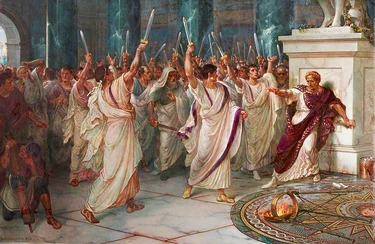 By M.P. Pellicer | Stranger Than Fiction Stories The Ides of March is linked to the assassination of Caesar in 44 B.C., however there were other tragedies that were marked by the full moon heralding the arrival of spring in the northern hemisphere. 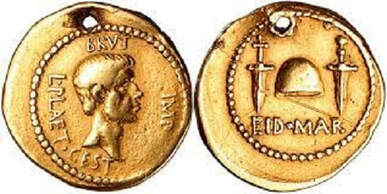 A gold coin commemorating the assassination of Julius Caesar A gold coin commemorating the assassination of Julius Caesar The Ides of March in the ancient world heralded the arrival of spring, the renewal of earth and a promise of life. In Rome, the Feast of Anna Perenna was celebrated to complete the circle of the year happily. Sacrifices were made to her, publicly and privately to assure a healthy year. This date was important for an agrarian society, and soldiers upon retiring were given farmland to work. In the Roman Era debts would have to be settled at this time. In 44 B.C., according to Plutarch, a historian and a priest at the Temple of Apollo in Delphi, Caesar was warned by a seer that harm would come to him. He didn't heed the prophecy, and he was stabbed 23 times in a conspiracy that included at least 60 powerful Romans. This event marked the beginning of the Roman Empire and the end of the Roman Republic, and sparked a civil war. The date held a symbolic meaning for Brutus, Cassius and others involved in the murder plot. Another important factor was that Caesar would leave in three days to join a military campaign against Parthia. The Senate would meet on the Ides of March, and this would place Caesar within grasp of the assassins. Brutus, whose name was linked with betrayal like Judas Iscariot, committed suicide two years later, and within a dozen years, many of the conspirators had been killed. The Ides of March was unfortunate for others beside Julius Caesar, these are some of those events. 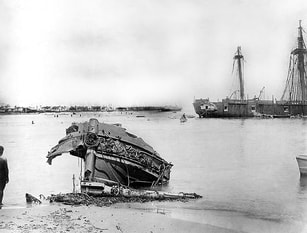 Wrecked ships in Apia Harbor, soon after the storm. The shattered bow of the German gunboat Eber on the beach in the foreground. The stern of USS Trenton is at right, with the sunken USS Vandalia alongside. The German gunboat SMS Adler is on her side in the center distance. Trenton 's starboard quarter gallery has been largely ripped away. Wrecked ships in Apia Harbor, soon after the storm. The shattered bow of the German gunboat Eber on the beach in the foreground. The stern of USS Trenton is at right, with the sunken USS Vandalia alongside. The German gunboat SMS Adler is on her side in the center distance. Trenton 's starboard quarter gallery has been largely ripped away. A Raid on Sussex, 1360 The Hundred Years War had pitted France and England against each other. A French raiding party attacked the port of Winchelsea in Sussex, and began a two-day spree of rape, pillage and murder. King Edward III who was pillaging France at that time, then launched a reprisal attack. The war ended in 1453. Samoan Cyclone, 1889 The effect of the cyclone was catastrophic, and the ships in the bay evacuated only at the last minute. Several ships made it out of the mouth of the bay in Apia, and Samoa was damaged with some loss of life. However six warships, three American and three German, who stayed in the harbor were totally destroyed. The death toll was well over 200 sailors. 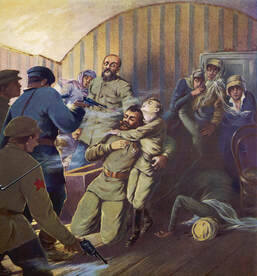 The execution of Tsar Nicholas II and his family at Yekaterinburg (Source - Mary Evans Picture Library/Global Look Press) The execution of Tsar Nicholas II and his family at Yekaterinburg (Source - Mary Evans Picture Library/Global Look Press) Czar Nicholas II Abdicates His Throne, 1917 Czar Nicholas II was forced to abdicate his position as the last in the line of a 304-year-old royal dynasty. In 1918, the Bolsheviks murdered the entire family including the children, by executing them before a firing squad. Of the House of Romanov's 65 members, 47 survivors went into exile abroad. This event ushered in the Bolshevik rule. The final fate of the royal family remained a mystery for many years. After Nicholas was removed from power, he along with his family were taken into custody by the Provisional Government. Their titles were stripped from them, and they were held in Alexander Palace in Tobolsk, Siberia. Once the Bolsheviks came into power in October 1917, the royal family's condition became much worse. Their final stop as hostages was Yekaterinburg's Iaptiev House.  Tsar Nicholas II with daughters (L-2nd R) Maria Romanov, Anastasia Romanov, Olga Romanov, Tatiana Romanov. The series of the unique pictures were taken by the Tsar Nicholas II himself or people close to the royal family. (Source - Getty Images) Tsar Nicholas II with daughters (L-2nd R) Maria Romanov, Anastasia Romanov, Olga Romanov, Tatiana Romanov. The series of the unique pictures were taken by the Tsar Nicholas II himself or people close to the royal family. (Source - Getty Images) A local announcement was made on the local newspaper by Bolshevik War Commissar Filipp Goloshchyokin, in charge of the family's incarceration in Yekaterinburg which stated: "All those under arrest will be held as hostages, and the slightest attempt at counter-revolutionary action in the town will result in the summary execution of the hostages." Pro-royalist soldiers called "Whites" were advancing on Yekaterinburg, and they feared the family would be rescued. While the Romanovs dined on July 16, 1918, the family and their servants were forced into the cellar where they were executed. Survivors from bullet wounds were killed with butts of guns or bayonets. This event marked the assassination of several allies and relatives around the country. The result was 27 deaths in 84 days. 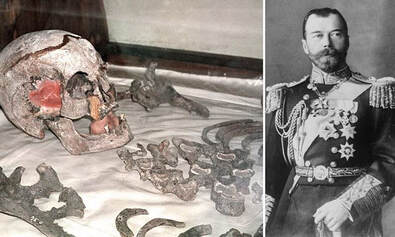 In 2015, DNA tests comparing the exhumed bones of Russia’s tragic last tsar to known royal bloodstains have proved beyond doubt that the final Romanov emperor’s remains are genuine In 2015, DNA tests comparing the exhumed bones of Russia’s tragic last tsar to known royal bloodstains have proved beyond doubt that the final Romanov emperor’s remains are genuine A few days later the official Bolshevik newspaper announced the execution of the czar where they called him, "the personification of the barbarian landowner, of this ignoramus, dimwit and bloodthirsty savage." They attempted to keep the murder of the royal family secret, but rumors spread, and the Bolsheviks claimed they had moved the Czarina and her children for their protection. The bodies were mutilated and burned with acid to impede identification. They were buried in secret graves in the forest. The Red Revolution had earned a brutal reputation, in and out of Russia. Socialist and communist ideas which were distrusted before, were more so after the overthrow of the Romanovs. King George V of England was Nicholas' first cousin. Though his death was met with sorrow, confirmation the family was massacred could have prompted political backlash and a military response. The Whites tried to prove the royal family were all killed, which would have severly damaged Lenin's image as a wise leader. It was not until the fall of the Soviet Union in 1991, that the bodies of five of the family members were found and given a proper burial in St. Petersburg Cathedral. In 2015, DNA tests were completed with material taken from the bones which proved these indeed were the remains of the Romanov family. 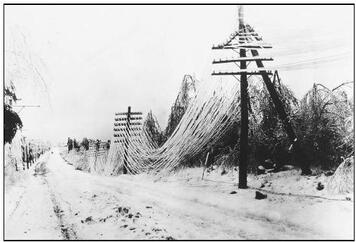 he blizzard that blasted the Northern Great Plains in 1941, caught many motorists unaware he blizzard that blasted the Northern Great Plains in 1941, caught many motorists unaware Germany Occupies Czechoslovakia, 1939 Nazi troops seized the provinces of Bohemia and Moravia. It began with the German annexation of the Sudetenland in 1938, and by the end of 1944 all of Czechoslovakia was under their control. A Deadly Blizzard on the Great Plains, 1941 Spring was technically one week away when the most severe blizzard in modern history struck Minnesota and North Dakota. People were out and about since it was Saturday night, then suddenly winds started to gust at 75 to 85 mph. The cold front enveloped the northern Great Plains in 7 hours, and in some locations, temperatures dropped 20 degrees in less than 15 minutes. Most of the 151 who died were caught traveling in their automobiles. World Record Rainfall, 1952 Almost 74 inches of rain fell in 24 hours on the island of La Réunion in the Indian Ocean. This set a world record.  Asteroid hit earth in the Spring... Ides of March? Asteroid hit earth in the Spring... Ides of March? Identification of Sudden Acute Respiratory Syndrome, 2003 After accumulating reports of a mysterious respiratory disease afflicting patients and healthcare workers in China, Vietnam, Hong Kong, Singapore and Canada, a heightened global health alert was issued. The disease became famous under the acronym SARS (for Sudden Acute Respiratory Syndrome). Asteroid Hit the Earth and Wiped Out the Dinosaurs (concluded in 2022 by researchers) According to Nature, experts using an extremely powerful X-rays and carbon isotope records of the bones of fish that died less than an hour after the asteroid hit, have concluded that the asteroid which killed the dinosaurs struck the earth in the spring. How much you wanna bet it hit on the Ides of March?
0 Comments
Your comment will be posted after it is approved.
Leave a Reply. |
Stranger Than Fiction StoriesM.P. PellicerAuthor, Narrator and Producer Archives
July 2024
Categories
All
|
Stories of the Supernatural
- Stories of the Supernatural
- Miami Ghost Chronicles
- M.P. Pellicer | Author
- Stranger Than Fiction Stories
- Eerie News
- Supernatural Storytime
-
Astrology Today
- Tarot
- Horoscope
- Zodiac
-
Haunted Places
- Animal Hauntings
- Belleview Biltmore Hotel
- Bobby Mackey's Honky Tonk
- Brookdale Lodge
- Chacachacare Island
- Coral Castle
- Drayton Hall Plantation
- Jonathan Dickinson State Park
- Kreischer Mansion
- Miami Biltmore Hotel
- Miami Forgotten Properties
- Myrtles Plantation
- Pinewood Cemetery
- Rolling Hills Asylum
- St. Ann's Retreat
- Stranahan Cromartie House
- The Devil Tree
- Trans-Allegheny Lunatic Asylum
- West Virginia Penitentiary
- Paranormal Podcasts
"When misguided public opinion honors what is despicable and despises what is honorable, punishes virtue and rewards vice, encourages what is harmful and discourages what is useful, applauds falsehood and smothers truth under indifference or insult, a nation turns its back on progress and can be restored only by the terrible lessons of catastrophe."
- Frederic Bastiat
- Frederic Bastiat

Copyright © 2009-2024 Eleventh Hour LLC. All Rights Reserved ®
DISCLAIMER
DISCLAIMER
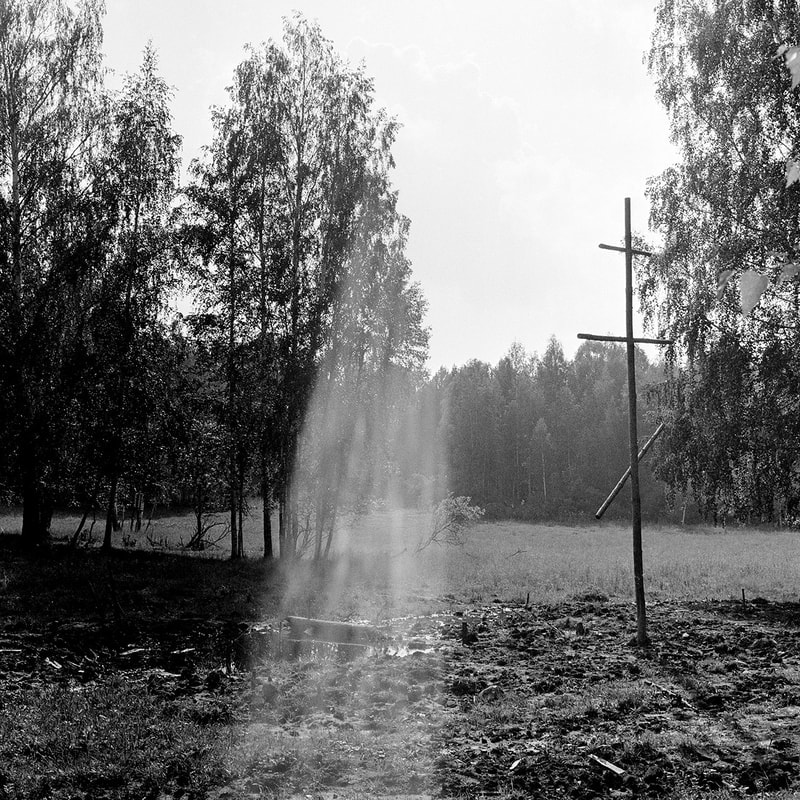
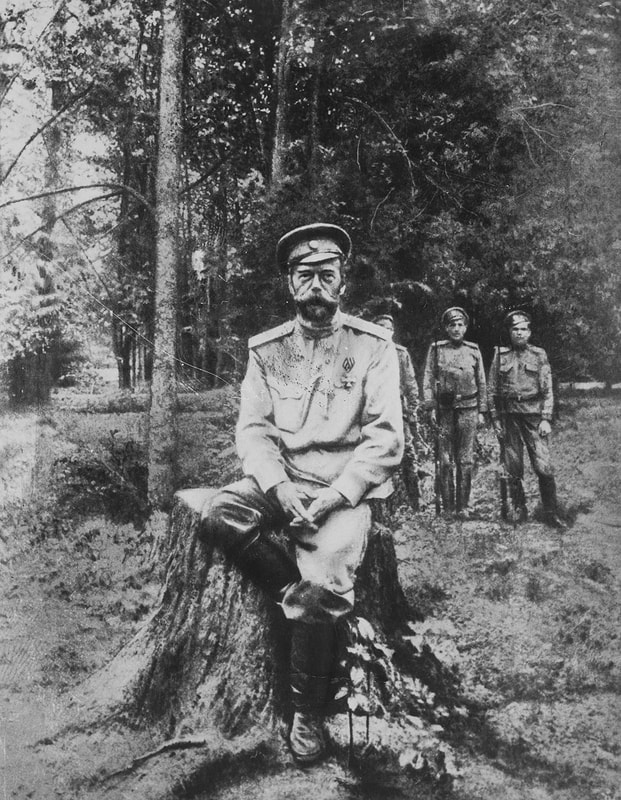
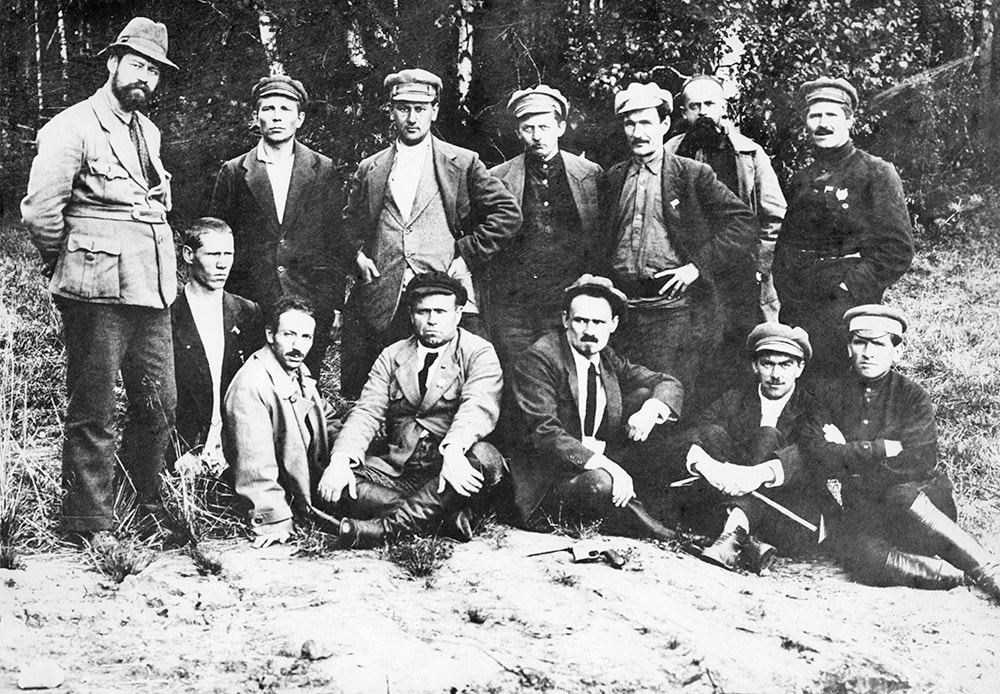
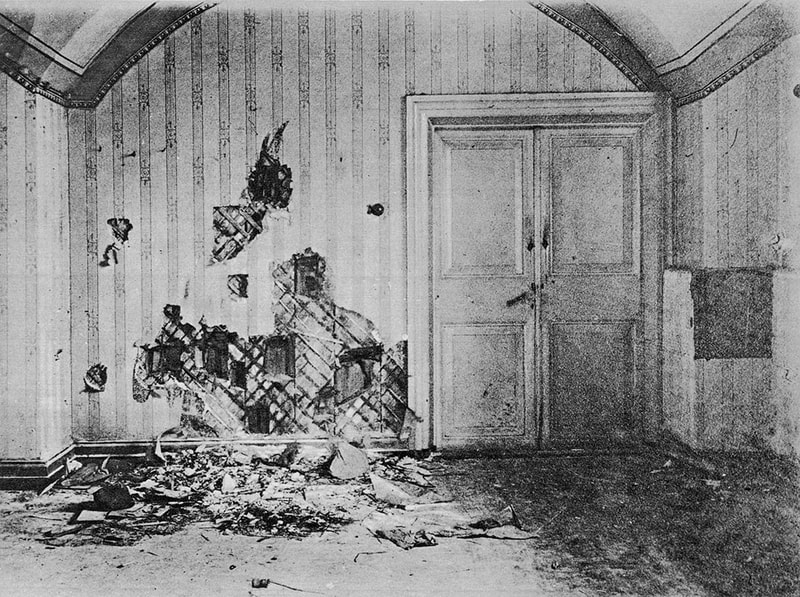


 RSS Feed
RSS Feed
















